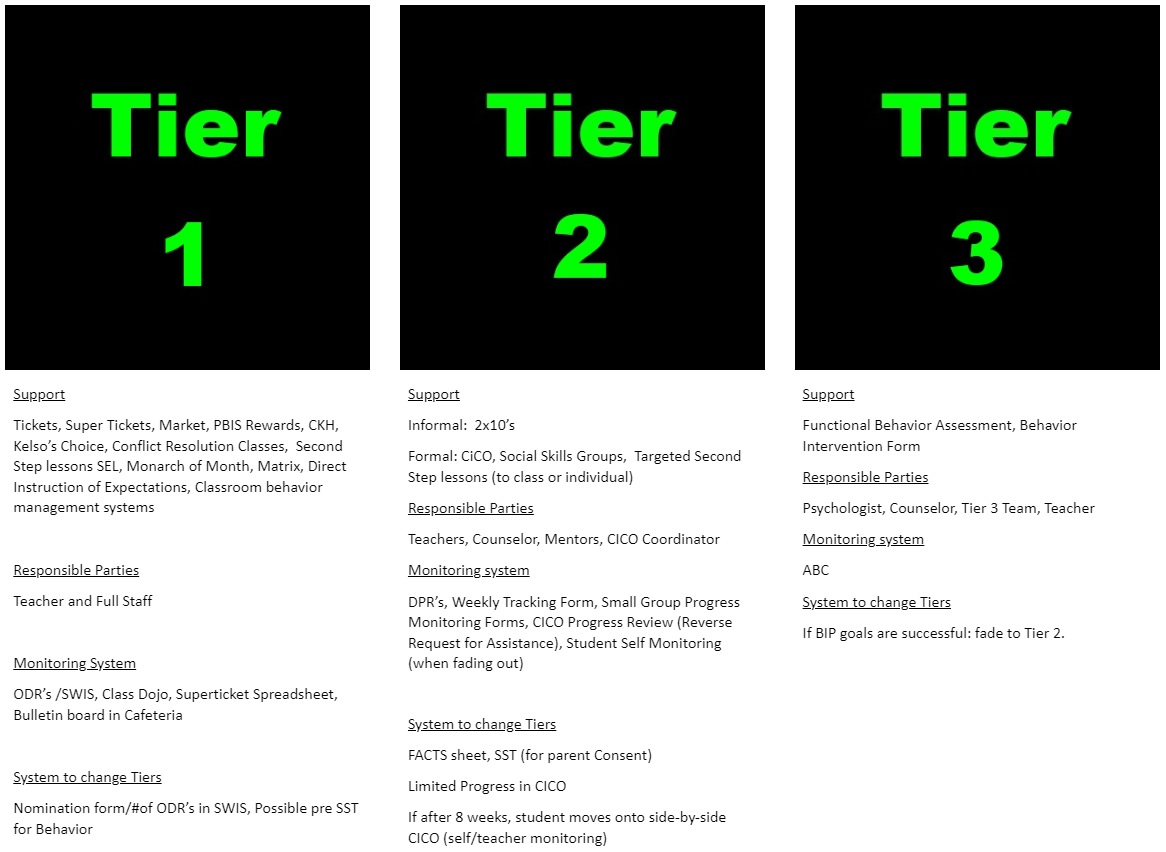- Mariposa Computer Science Magnet School
- Support System
-
Behavioral Support System
Tier 1:
Tier 1 provides high quality behavioral instruction and supports for all students. More than 80% of students will be successful in this tier. Classroom management and individual student behavior is based on expectations, responsibility, and proactive feedback. Oftentimes, academic deficits will lead to behavioral challenges.
If a student fails to learn at a level/rate similar to his/her classmates, the teacher will:
-
Change the type of instructional or behavioral strategy (intervention)
-
Increase the intensity or level of the intervention (for example, adding small group instruction to whole group instruction).
-
Increase the duration of the intervention (for example, increase small group instruction from 15 to 30 minutes).
-
Increase the frequency of the intervention (for example, from twice per week to four times per week).
Once several interventions have been unsuccessful, and the student is not responding adequately, the student will be referred to the Tier 2 to discuss further interventions.
Tier 2:
Check In/ Check Out (CICO)
Students may be referred to CICO by either acquiring 3 majors or 6 overall Discipline referrals within a 30-day period of time, or by teacher request. The student will be assigned to an adult greeter to follow the CICO procedures with a daily goal of 80%. Progress will be monitored for at least 6-8 weeks. If there are no improvements within 2-4 weeks, the team will re-evaluate. After students are meeting their goal on average for about 4 weeks, the interactions will be reduced and will begin to fade. This means the student will complete their CICO form in pencil independently and the teacher will also complete using a pen. If scores agree and student is maintaining their goal, they will graduate from the program.
How is CICO implemented?
-
A student checks in with a specific adult at the start of the school day.
-
The adult gives the student a point sheet that has the specific goals/expectations the student is working on.
-
The adult speaks briefly with the student in a positive manner, to encourage them and remind them what they need to focus on to meet the goal.
-
The student goes through their day with the point sheet having the teacher check how well they did during that time period.
-
At the end of the day, the student checks out with the same adult they checked in with. The adult briefly talks with the student, asking them how they feel they did, what they did well on, and what they need to work on.
-
A copy or score should be returned to Angela Medina (Counselor) for monitoring progress.
-
The student then takes their point sheet home to show and discuss it with their parent to be signed and returned if need be.
-
The daily goals may be used along with a reward system where the student receives an incentive for meeting their goal.
Social Skills Groups
When CICO isn’t working, students may be referred to Social Skills groups. These groups will meet weekly and will focus on re-teaching and practicing specific appropriate behaviors. Students will be placed in groups with same age peers and participate for 9 weeks. Behaviors will be observed to monitor progress. If after 4 weeks, the student is not responding to Tier 2 interventions, a more intensive or additional intervention and/or consult referral may be considered.
-


